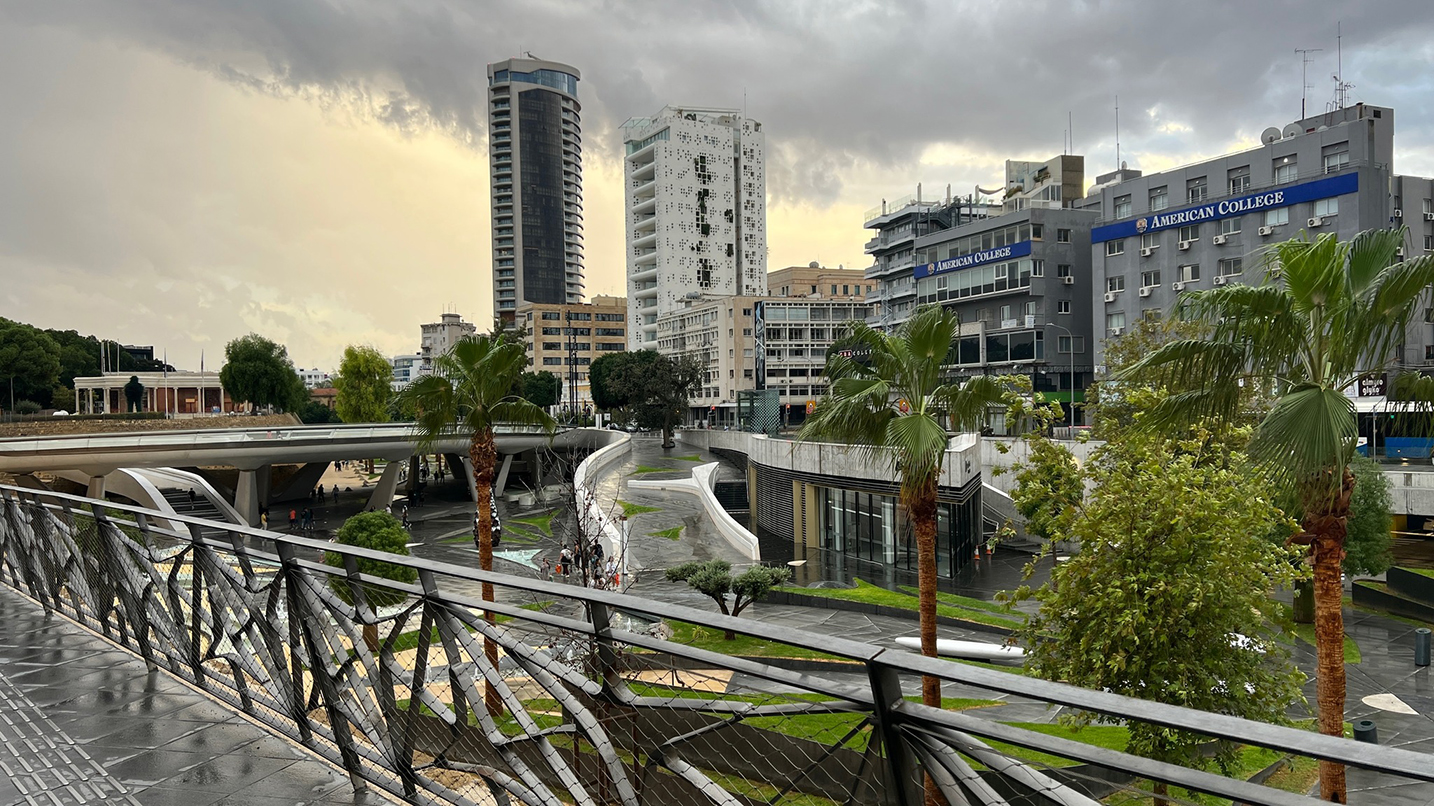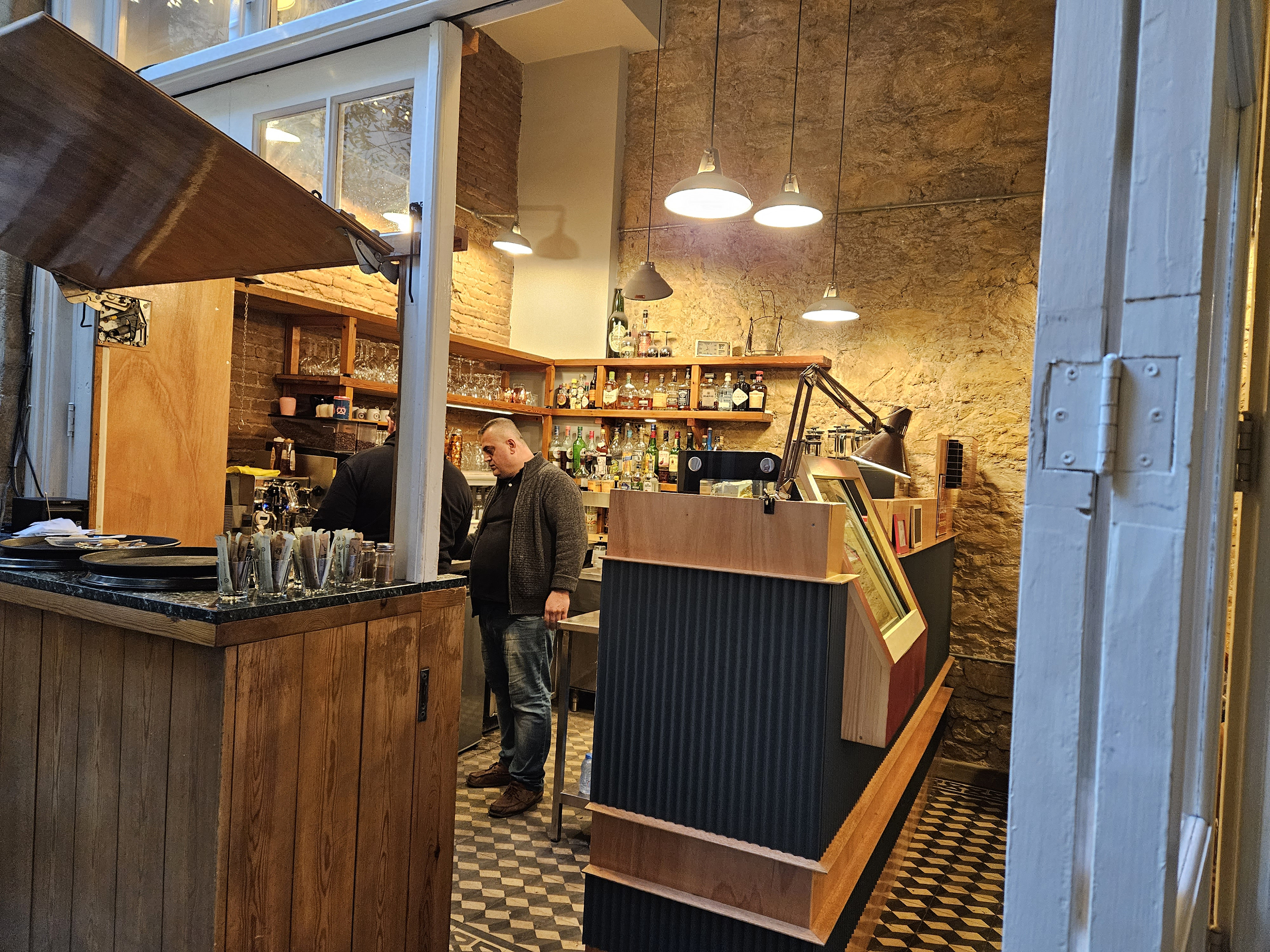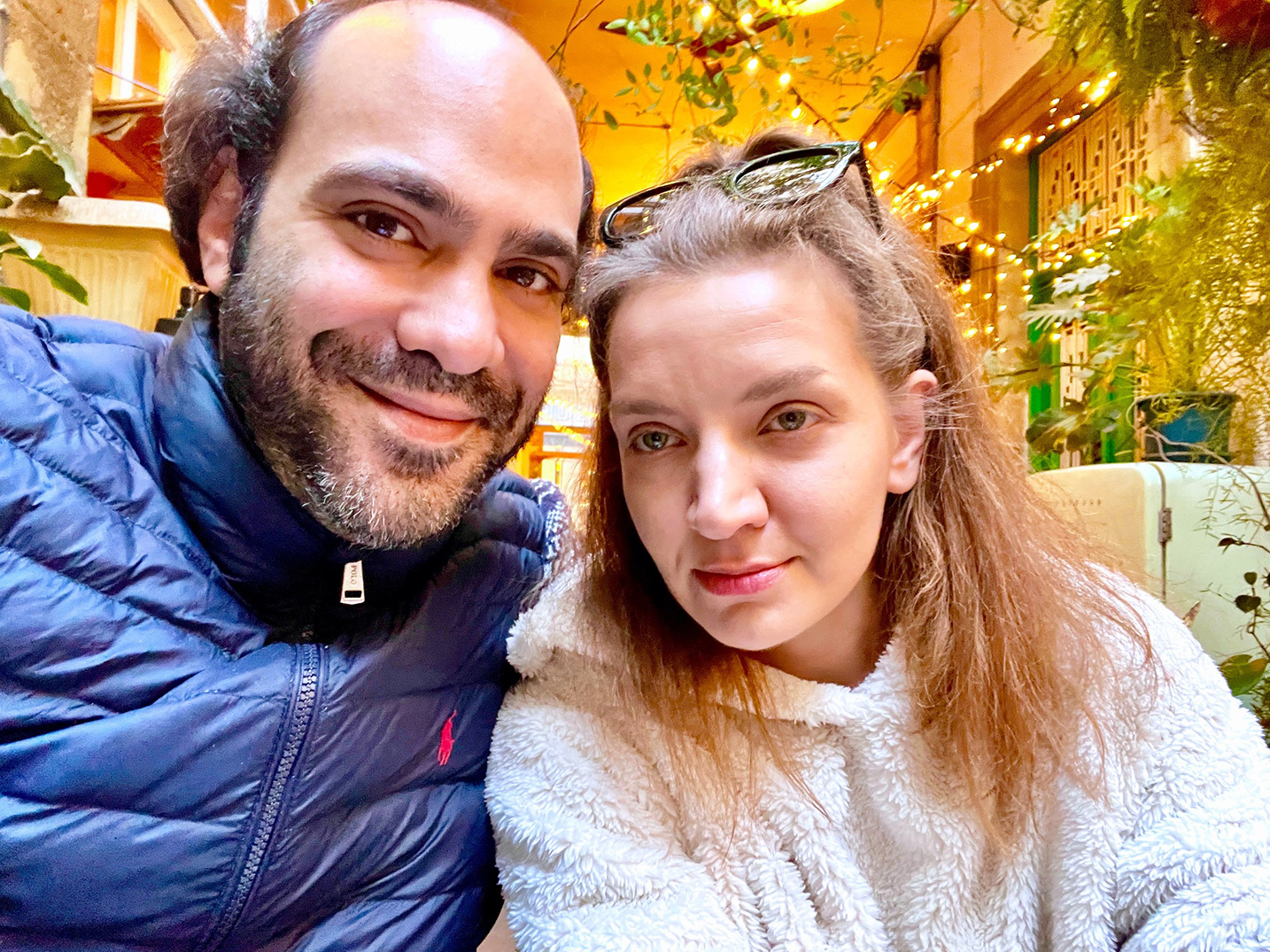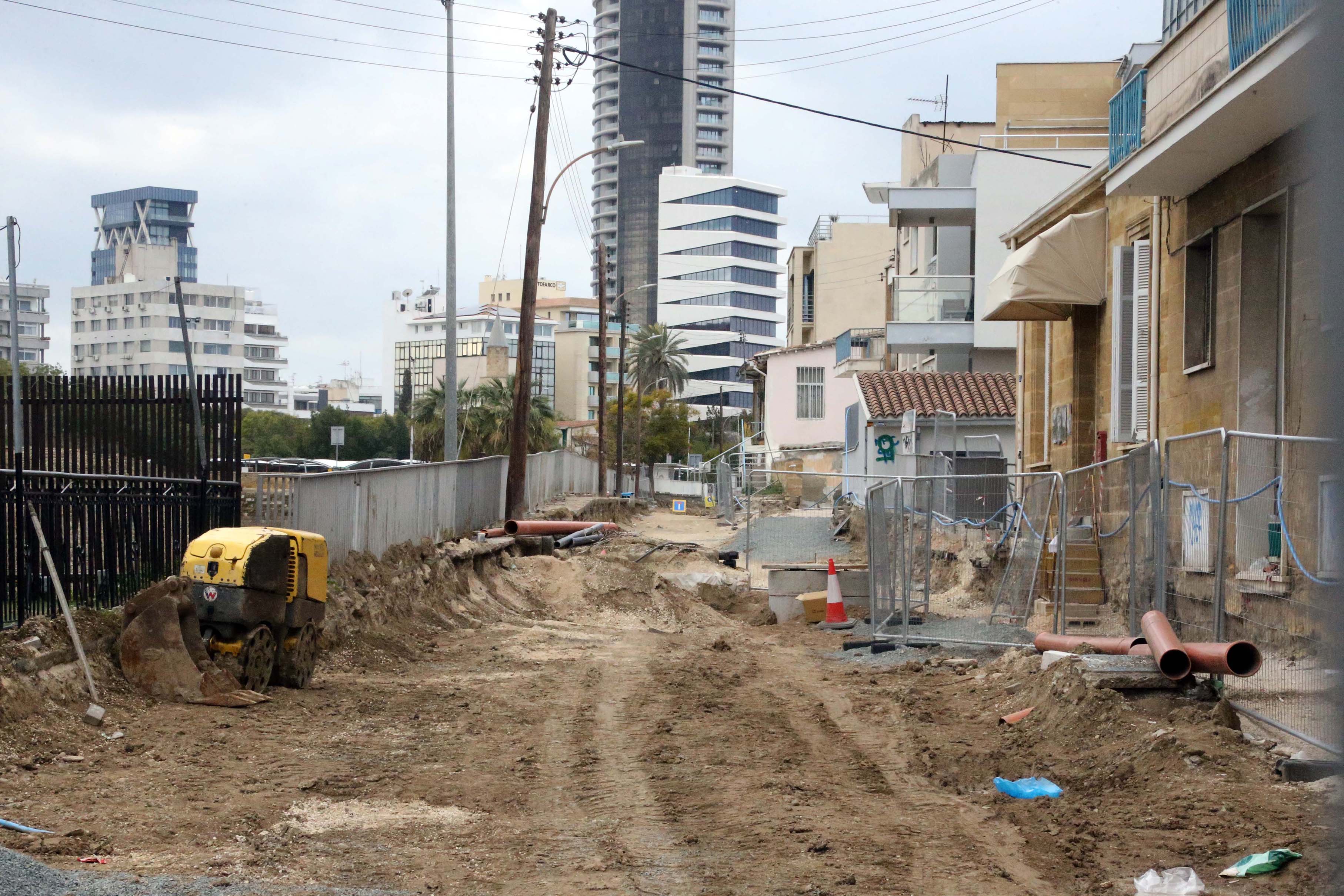Living and breathing life in the ‘historic city centre’, one man is a real voice of the people in the area, and full of solutions to its problems
Antonis Koupparis shows me videos on his phone. The clips are mostly CCTV footage, plus videos he shot himself: a low-res litany of crime and disorder in the walled city of Nicosia.
“This is me finding a homeless African guy on the roof of my wife’s mum’s apartment in Germanou Patron street. She went up to hang some clothes and she got terrified, so I went up and told him, ‘Man, please…’ He was a polite person, but you don’t really know who is there…
“Here is someone pissing on the street – right here, on Apollonos street…
“Here’s an Indian guy who was drunk and completely out of touch with reality, shouting outside Olympios jewellery. I stopped [filming] because I had to immobilise him, let’s say. I pushed him against the wall, and I kept him until the police came and picked him up…
“Here are people trying to break into our shop, and they’re stealing Evroulla’s tomatoes [Evroulla is a local eatery] from outside. They stole tomatoes! He put on a hood – look, he’s taking a box of tomatoes and running away…
“This guy was a Romanian guy, who was drunk, stealing everything from the neighbourhood… Here’s the same guy after the police took him to Diachroniki Gallery for Mr. Kikas to identify him, because he stole his phone. The same person – and then he’s out the next day…
“This is one of the guys selling drugs in our area… Here is a drug deal going on in Voulgaroktonou street… Here is this guy who was stabbed in Rigainis street a while ago.”

Finally, the pièce de résistance: a video of himself, Antonis Koupparis – together with a neighbourhood cop – “setting a trap for a drug dealer”.
At this point, we should pause and make clear that Antonis’ intention is in no way to attack – or dissuade people from visiting – old Nicosia, a neighbourhood he loves and has devoted most of his life to, having lived there for some years and owned a business there since 2006. (I should also add that, as a regular visitor to the area, I’ve never seen anyone being harassed or threatened.) What the videos actually reflect – aside from exposing the official neglect of the old town – is twofold. First, his personal fearlessness. Second, his extensive knowledge of local lore, and the central role he plays in the neighbourhood.
Fearlessness isn’t an obvious trait for an entrepreneur in the hospitality sector, but it’s definitely there – and not just in battling drug dealers and ‘immobilising’ drunks, either.
A decade ago, he recalls, the emissaries of a well-known local gangster came to Pieto, the funky café he owns on Ledra street, seeking protection money. Later, having been rebuffed, the thugs went to his home, kicked in his back door, put a knife through his cat (!) and set fire to his car. Yet he still refused to capitulate, says Antonis stubbornly – and the whole thing might’ve ended very badly, had a third party not intervened (on their own initiative) and convinced the gangster to leave him alone.
He’s fearless in another way too, being open and honest past the point of self-preservation. He names names, and lambasts individuals – even, or especially, public officials – for what he sees as their corruption and indolence.
I’m expecting a wink and a nudge at the end, asking me not to publish his more incendiary opinions, but it never comes. (I leave them out anyway.) He truly doesn’t seem to care about making enemies – or, more likely, views being honest as “a matter of principle”, a phrase that recurs more than once in our conversation.
He’s really an extraordinary person, a force of nature – though he looks mild enough, with amused, gentle eyes and a receding hairline. We meet (of course) at Pieto and he talks for three hours, first in Greek then equally unstoppably in English. “I was at the English School,” he replies vaguely when I ask about his fluency in that language – though another factor is surely Aija, his Latvian-born ‘wife’ (they’re not married, but have been together for 18 years now). He and Aija make the cakes at Pieto themselves, his life – like any small businessman’s – intertwined with his business.
How often is he here?
“Every day. Every day of the week, every day of the month, every day of the year.”
For how many hours?
He shrugs: “15, 16… Any moment that I’m awake, basically – and I’m not at home in the bathroom or something – I’m in the historic city centre. I’m here. Either in my shop, or talking with the people in this neighbourhood”.

He’s a workaholic, always has been. Back in his 20s (he turned 40 last summer), he was already running four businesses: Pieto from 2012, before that a creperie in the old town, before that an internet café, before that (though overlapping with the others) the jacket-potato place Jack in the Box which became a successful chain, with branches in Limassol, Larnaca and even Athens. “I sleep very few hours,” he explains. “Four hours a night, sometimes five… I dunno, I’ve always been that way.”
What does he do to relax?
Long pause. “I eat!” he replies with a laugh, then shrugs wryly. “I feel like I’m tense most of the time, [so] I keep my mind occupied… I’m trying not to be upset by the things I experience, and the things I see around me – so I keep my mind occupied with something. If it’s not work, it’s something else.”
His mildness is deceptive; even his current appearance is a bit deceptive. He surely must’ve looked a lot fiercer when he sported a bushy beard, as he does in many of the videos, or a few years ago when his weight had ballooned up to 135 kilos (it’s now a more manageable 93). I assume he does stress-eat, especially when his mind isn’t occupied – with work or ‘something else’, as he puts it.
Work might’ve been enough, for a less intense person. Pieto is a charming, distinctive place – ‘News, treats and coffee room’, as it says on the sign. He’d hoped it might become a hub for discussion, says Antonis, like the coffee houses of the Enlightenment (“I was younger; I had a different energy”), but it never quite panned out that way.

Still, the clientele is notably varied. “These are young people, are they not?” he notes dryly, pointing, when I say that youngsters go to malls these days and the old town is probably finished – but in fact he gets all ages and “all kinds of people”, including from across the divide. (Turkish Cypriot activist Oz Karahan stops by our table, greeting Antonis warmly.) My espresso is excellent – their coffee machine is “the best in the world,” he says, naming a brand I don’t recognise – and comes in a diminutive glass cup. Three laid-back cats lounge around the place. The menu includes ‘signature drinks’ with combinations like orange tea, jasmine and cinnamon.
Yet their situation is precarious, especially with old Nicosia so mismanaged and chaotic. “The margins are so, so narrow that one small mistake…” he says, letting the sentence trail off. “I mean, I do believe that every business – every small business – is in danger of closing down at any moment”.
Hence, perhaps, the ‘something else’ – the profusion of topics in which Antonis Koupparis immerses himself, as if battling to take control of his own destiny.
Politics is (or was) one such topic. He stood for deputy mayor of Nicosia and also spent a decade on the political committee of the Cyprus Greens, stepping down just a few weeks ago – though “I still consider myself an environmentalist, I’m just not a member of the Green party… I appreciate those people, and I consider most of them my friends”.
So then why did he quit?
“I just disagreed on something. It was a matter of principle.”
That leaves only his most intense focus, his specialist subject – his obsession, one might say: old Nicosia, the ‘historic city centre’, and the various mistakes that were made (and continue to be made) in administering it.
He’s on Facebook all the time, posting rants and videos – but anyone can be on social media, and rant, and have videos on their phone. What’s striking about Antonis is his grasp of detail, the depth of his knowledge.
We talk, for instance, of the kid-friendly mini-train that, for years, was a feature of the town, chugging up and down Ledra – and not only does he know the sordid back-story, explaining how it wasn’t “managed in a transparent way”, but he also knows what should have been done, telling me there’s such-and-such a company making trains in the Netherlands – “they’ve also got a factory in Canada” – which are specially designed for pedestrian areas.
We talk of supply trucks clogging pedestrianised streets in the morning, before 10am (when pedestrians are out in force, especially in summer) – and, again, he doesn’t just rant about the problem, but offers solutions. Other cities – Gothenburg, for instance – use a consolidation system, having companies deliver to a collection point outside the old town where a sub-contractor (“an expert in logistics”) takes over, getting supplies to the shops more efficiently and in smaller vehicles. Why can’t they do that here?
We could go on and on – piles of rubbish, road substrate falling apart, money laundering, low-income housing, migrants in atrocious conditions – but you get the idea. “You know,” says Antonis at one point, more or less summarising his view of the subject, “there is a continuous war going on, between the people of this city and the authorities who don’t understand the people”.

Limassol – it’s true – may be even worse, in the sense that the historic centre is actively being torn down there, to make way for skyscrapers. But it’s bad in Nicosia too, in fact it’s sadder because everything’s collapsed, left to rot, growing seedy and crime-ridden.
“I believe that they’re not incompetent,” he says of the authorities. “They have a plan for urban gentrification, [which involves] abandonment. They want to destroy the city, then they will be able to rebuild it in any way they want.
“And Big Business will come and reap everything that they have done – and we will be visiting the area, and we’ll be remembering, ‘I used to have a shop over there. They were good times. Hard times, but good times’… I don’t know what I’ll be doing in the future, but if things continue this way, it’s a certainty that this will happen.” He shakes his head: “This thing terrifies me. And it must be avoided at any cost”.
He’s involved on a daily basis, constantly trying to avert disaster. He’s “representing the actual shopowners and residents of the area,” he says, that ‘actual’ an ironic dig at the fact that the official shopowners’ association includes some who no longer work in the old town. His group numbers 81 people – and they’re constantly in touch with the mayor, currently fighting to reverse the municipality’s decision to close a vital road (from Ochi to Eleftheria square) for roadworks that’ll take a year or more. “It will be deadly for our businesses.”
Will they succeed? Not necessarily. “We present very good proposals,” he sighs, “and we’re always being ignored. Always, in the end. And that is tiresome for everyone.”
The system is deeply entrenched. It may even win. The centre could become a no-go area, as in many American cities – or else impersonal, like it is in Dubai. The current fashion for erecting tall buildings at the edge of the Venetian walls is a very bad sign.
Antonis Koupparis is aware of that possibility; he might even welcome it. He’s turned 40, after all, he and Aija would like to start a family – “but we’ve put everything on hold,” he says, consumed in the bitter fight for the walled city. Being a dad would be a much more rewarding ‘something else’ than this constant battle against venal bureaucrats.
Maybe. But as long as the battle goes on, he’ll keep fighting, still as stubborn as he was with those (other) gangsters a decade ago – using the law (he’s sued the authorities three times), social media, plus his own force of character and powers of persuasion. He’ll even set traps for drug dealers, if that’s what it takes. Meanwhile, the videos pile up on his phone, fuzzy testaments to a dismal situation.






Click here to change your cookie preferences